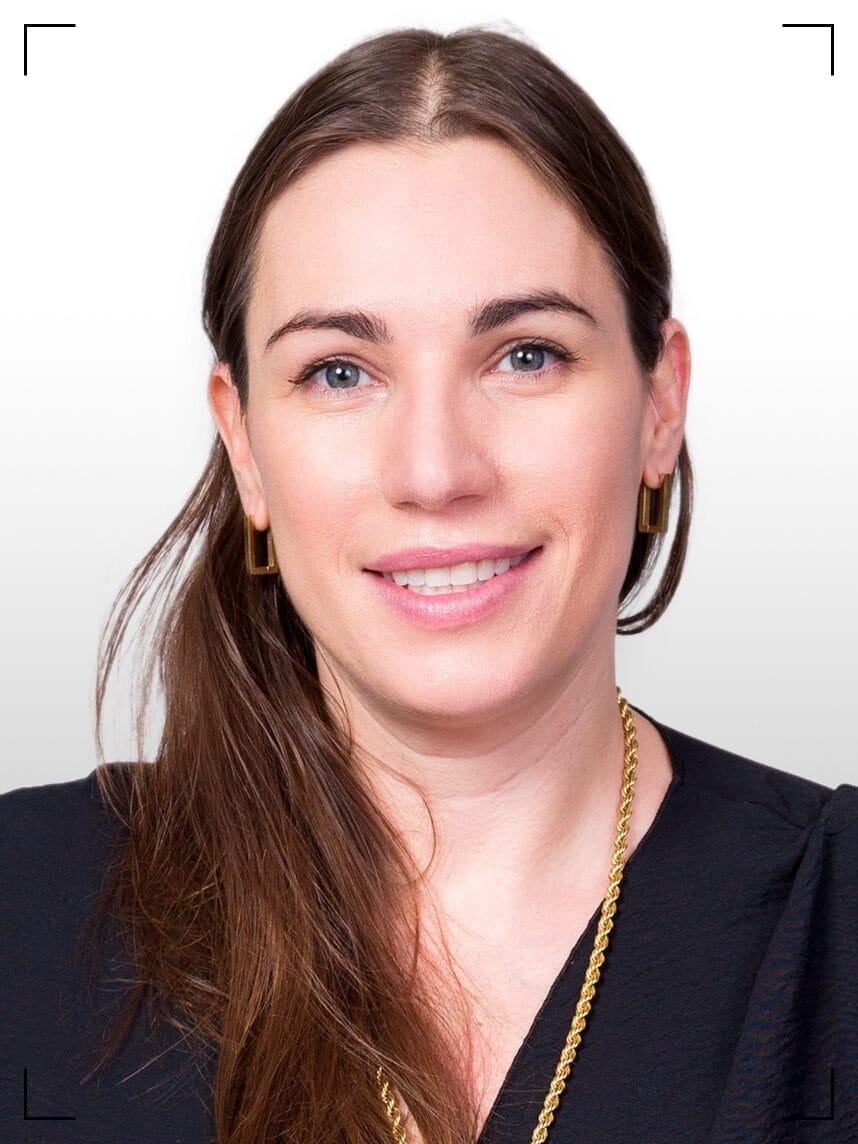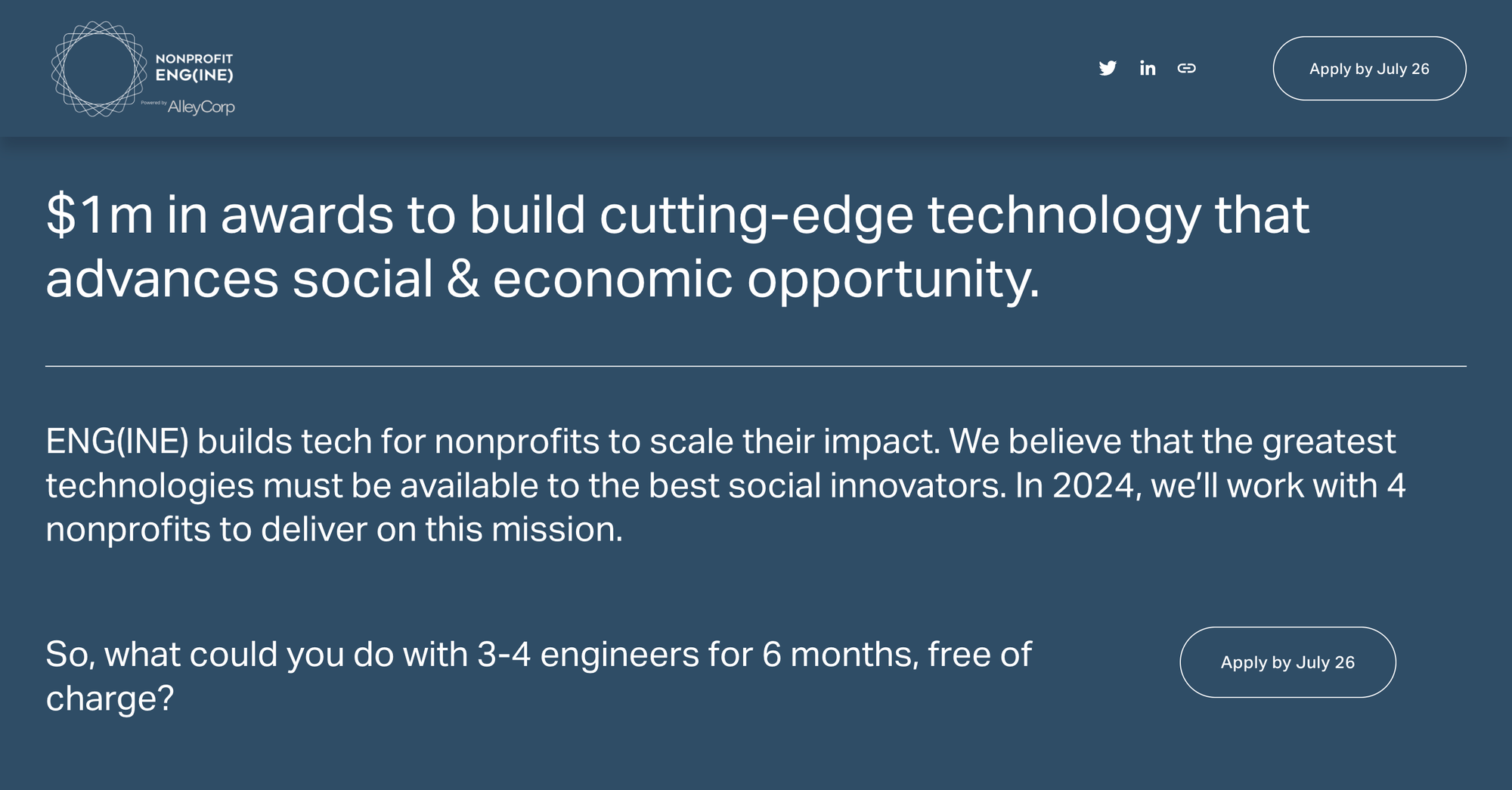AlleyCorp, a New York-based venture capital firm, has unveiled its latest initiative, Nonprofit ENG(INE), aimed at bridging the technology gap for nonprofit organizations.
With a focus on providing $1 million worth of engineering and tech support to four deserving nonprofits, AlleyCorp's Nonprofit ENG(INE) initiative is poised to redefine how nonprofits access and leverage technological resources.
In today's evolving tech landscape, nonprofits often struggle to keep pace due to limited resources and expertise.
Nonprofit ENG(INE) addresses this challenge by offering free access to AlleyCorp's team of over 70 engineers, who will provide tailored support to help nonprofits harness the power of technology in advancing their missions.
The initiative prioritizes nonprofits dedicated to career advancement, financial security, and improving the lives of women and girls, ensuring that support is directed where it can make the most significant impact.
Nonprofit leaders interested in applying can submit their applications through the dedicated website before the July 26th deadline.
AlleyCorp's commitment to fostering impactful partnerships extends beyond financial support.
Through Nonprofit ENG(INE), AlleyCorp aims to serve as a strategic ally, empowering nonprofits to amplify their impact and drive positive change in their communities.
As the deadline for applications approaches, nonprofits are encouraged to seize this opportunity to collaborate with AlleyCorp and unlock the full potential of technology in furthering their missions.
Nonprofit ENG(INE) represents more than just a grant program; it's a testament to AlleyCorp's dedication to leveraging innovation for social good and paving the way for a brighter future.
Below is a Q&A with Tanya Beja, General Partner at AlleyCorp.
About Tanya Beja
Tanya serves as a General Partner overseeing the Impact team, directing investments and incubations tailored to support working families directly. With a rich background at the nexus of venture capital, venture philanthropy, and social entrepreneurship, Tanya brings a wealth of expertise to her role.

Prior to joining AlleyCorp, she held the position of Head of Latin America at Blue Marble Microinsurance, where she played a pivotal role in incubating and expanding socially impactful, commercially viable insurance solutions for underserved populations.
Previously, Tanya managed a substantial $10 million portfolio of grants and program-related investments, spanning crucial areas such as homelessness, housing, and workforce development, during her tenure at the Robin Hood Foundation.
Her career started at IGNIA, an impact investing venture fund in Latin America, where she focused on supporting startups dedicated to serving the emerging middle class across the region.
Tanya earned her master’s degree in public policy from the prestigious Harvard Kennedy School of Government, complementing her academic achievements with a BA summa cum laude from Tufts University.
What was the catalyst for launching the Nonprofit ENG(INE) initiative?
As an incubator and investor in early-stage startups, we’ve seen firsthand how finding great engineering talent can be a bottleneck for companies as they scale.
It’s actually what led us to build our own engineering hubs in Montreal and Bogotá, where we staff 70+ engineers to accelerate our portfolio’s tech development and go-to-market capabilities.

We launched Nonprofit ENG(INE) to ensure great nonprofits don’t fall behind in adopting advancements in AI, automation and tech infrastructure.
While we invest exclusively in startups, we connect with nonprofits all the time in the sectors that we focus on most, including education, workforce, health equity, and financial security.
Through those conversations, we’ve seen over and over again the desire to adopt best-in-class technologies to enhance nonprofits’ service delivery, but the lack of talent, tooling, and resources get in the way.
Our goal in launching ENG(INE) is to help bridge some of those gaps, so that these crucial organizations are able to get their hands on the best technologies available to deliver on their mission.
What type of organizations should apply?
Organizations must be a 501c3 based in the US. Priority will also be given to organizations that focus on one of the following key issues: workforce, financial security, and/or improving the lives of women and girls.
These are areas that our startups are tackling from a for-profit perspective and also areas where we believe nonprofits have an important role to play.
Nonprofits are eligible to apply if they…
Based in the U.S.
Nonprofits should be registered as a 501c3.
Have an in-house engineering team
Nonprofits should have an engineering team that can closely work with our team and maintain the build beyond our engagement.
Can scale their impact using technology
Nonprofits should have identified a critical technical gap and can make the case for how fixing it delivers scale and greater impact.
Focus on at least one of these areas
Nonprofits should should be primarily working on Workforce, Financial Security, or Women and Girls.
Do the organizations need to be in business for a certain amount of years to apply? What are the entry requirements for nonprofits?
In addition to the criteria I already mentioned, organizations should have some sort of existing tech infrastructure or internal technical staff that our team of engineers can work with.
In the application process, it will also be important for organizations to explain why and how technology can help scale their impact.
Does each organization get $1M of free engineering / tech support. Or will the four winners receive $250k in support?
Four separate winners will each receive $250K in tech / engineering support.
What type of engineering and tech support comes with the prize? App development, web development, email funnel creation, donation processing setup, CRM setup?
What I think is so compelling about this offering for nonprofits is that there isn’t just one singular type of tech support that our staff of 70+ engineers will be providing.
Services will be entirely bespoke to what the nonprofit winners need the most to advance their mission and scale their impact.
ENG(INE) pairs nonprofits with a team of engineers over 6 months to deliver major, strategic technological builds.
To list a few examples, it could be anything from building or updating an organization’s cloud infrastructure; testing or implementing AI to solve user pain points or automate manual workflows; or migrating databases or system architectures to more reliable tech.
Again, those are just a couple of areas that we feel could be most impactful and also where our engineering team has deep expertise.
Ultimately, regardless of tooling, we believe in democratizing access to the best engineers and using tech to solve big social challenges.
This project has some amazing partners involved, talk about how all these partners are laying a role in this initiative?
I’m glad you brought this up, because this initiative would not have been possible without our incredible partners:
Code for America, Fast Forward, BlueRidge Labs, Robin Hood Foundation, The David Prize, Siegel Family Endowment, Patrick J. McGovern Foundation, Tech:NYC, and New York City Economic Development Corporation.
Each are supporting ENG(INE) in different ways, whether that’s participating in the selection and judging process or spreading the word and tapping their networks to encourage more applications.








